#battle of ratisbon
Text
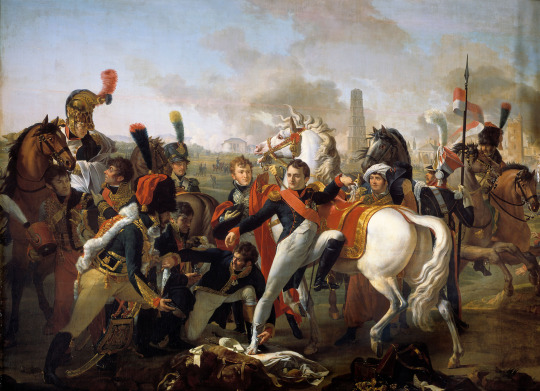
Napoleon dismounting with an injured foot at Regensburg, aided by the Surgeon, Yvan, 23 April, 1809
by Claude Gautherot
#napoléon#napoleon#bonaparte#napoleon bonaparte#napoléon bonaparte#art#battle of ratisbon#battle of regensburg#napoleonic wars#roustam raza#claude gautherot#pierre gautherot#pierre claude gautherot#dezydery chłapowski#alexandre urbain yvan#france#germany#history#french empire#austrian empire#holy roman empire#europe#european#french#regensburg#napoleonic#napoleon i#emperor#empire#bavaria
60 notes
·
View notes
Text
24th April
Incident of the French Camp by Robert Browning
The Battle of Ratisbon took place on this day in 1809, between the French forces of the Emperor Napoleon, and those of imperial Austria; the French won. In this poem Browning imagines an exchange between the Emperor and a dauntless young French soldier bearing a message from the front. Three of the six stanzas follow below.
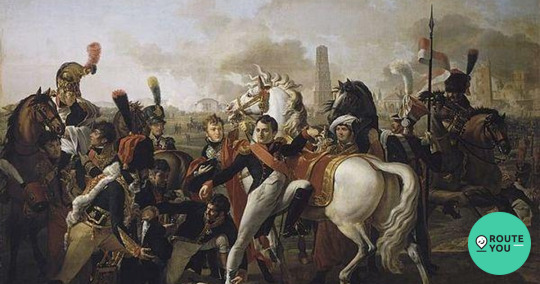
The Battle of Ratisbon by Charles Thevenin. Source: Route You website
Incident of the French Camp
You know, we French storm’d Ratisbon:
A mile or so away,
On a little mound, Napoleon
Stood on our storming-day;
With neck out-thrust, you fancy how,
Legs wide, arms lock’d behind,
As if to balance the prone brow
Oppressive with its mind.
…
Then off there flung in smiling joy,
And held himself erect
By just his horse’s mane, a boy:
You hardly could suspect -
(So tight he kept his lips compressed,
Scarce any blood came through)
You look’d twice ere you saw his breast
Was all but shot in two.
…
The chief’s eye flashed; but presently
Softened itself, as sheathes
A film the mother-eagle’s eye
When her bruised eaglet breathes.
‘You’re wounded!’ ‘Nay,’ the soldier’s pride
Touch’d to the quick, he said:
‘I’m kill’d, Sire!’ And his chief beside
Smiling the boy fell dead.
The taking of Ratisbon resulted in an orderly Austrian retreat from Bavaria before Archduke Charles’ army was destroyed at Wagram and Napoleon entered Vienna. The battle is notable for one of the extremely rare occasions that the Emperor himself received a slight wound.
1 note
·
View note
Text
Analysing the Quality of Napoleon's Marshals With Silly Data Science
Let's talk numbers and laugh at funny graphs with missing data!

Other people in this fandom do really lovely detailed information posts, I do weird fanfic, dragon shitposting, body pillow design shitposting and run a stupid Lannes ask rp blog. But! I'm also a programmer with an interest in Numbers, and today we're going to Analyse These Dead Frenchmen with a bunch of screenshots of graphs.
Ethan Arsht published a really interesting article called Napoleon was the Best General Ever, and the Math Proves it., where using data scraped off Wikipedia articles, he creates a statistical model drawing from multiple variables per battle to calculate How Good A General Is At Winning.
Give the article a read, it's great stuff, but if you don't feel like it, he basically applies WAR - "Wins Above Replacement" - which is a value from baseball that measures how many wins a player is worth when compared to a replacement.
So the general's WAR would be how well they compare to a completely average general who replaced them. Yes, as Arsht says, "in other words, I would find the generals’ WAR, in war."
But as he says, this is not a stringent historical analysis and is more of a fun thought experiment. Wikipedia is probably the most comprehensive dataset on this topic that he had access to, but it is Wikipedia the crowdsourced online encyclopedia, so it is going to have holes and inaccuracies. And this was written seven years ago, and the data was collected then, so any updates to these articles since then wouldn't be reflected.
And it's not a perfect model that takes into account everything - it's an approximation, a whole bunch of number crunching. I haven't looked too deeply into how the numbers work exactly, even though I could.
I think that 0 would be "completely and utterly average"? A positive WAR is good, a negative WAR is not. Napoleon is the best general ever at 16.679 WAR, the next highest is Caesar at 7.445 WAR.

(Link, you can hover over each battle and look at each datapoint!)
But I'm interested in Napoleon's marshals. The 26 men he raised up to military nobility! The dramatic assholes who kept arguing with each other. I'll post links for all of them at the end of this, but I won't be screenshotting each of their WAR graphs, just a few.
I'm not entirely sure how the scraper collected the information about what battles a commander is considered in "charge" of - I tried looking at the provided code repository but I am reminded that data science people bless them are not really good at structuring or publishing code and why are all the html pages just straight up saved in the root folder why are the jupyter notebook outputs just uncleared aaaaaaaaaaaaaaa
Oh yeah this was scraped from seven years ago so current wikipedia pages won't be reflective of what's on the graphs - so we can assume that this is just grabbing stuff from the "Commanders and leaders" part from each individual battle page and collating them into numbers
Anyway let's look at the iron man himself, Davout, considered to be the best of Napoleon's marshals.

(Link)
Heh, here we see the first hole in the dataset - Jena-Auerstedt is considered to be one battle, and Napoleon would like you to think that's the case.
Anyway, pretty good! Let's look at Jean Lannes, the lively Gascon
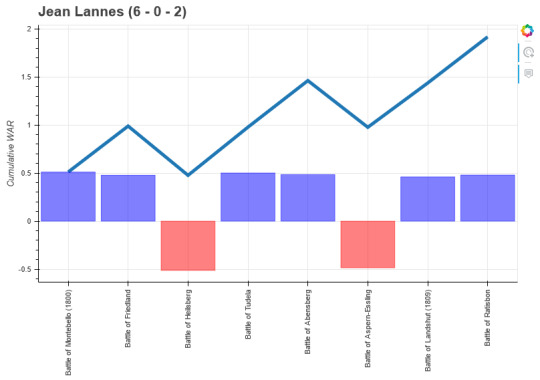
(Link)
Oooooh, even better than Davout! Helps he didn't go to Russia. Wait, why is Aspern-Essling dated to before Ratisbon, especially when Lannes died in the former?
Let's look at André Masséna, also known as being pretty cool:
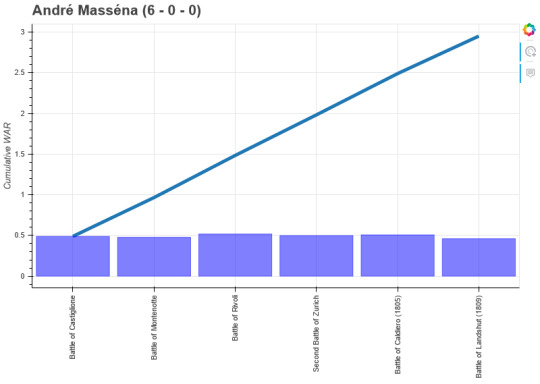
(Link)
Damn, neat, though I think there's a lot of omissions here.
Here's Murat:
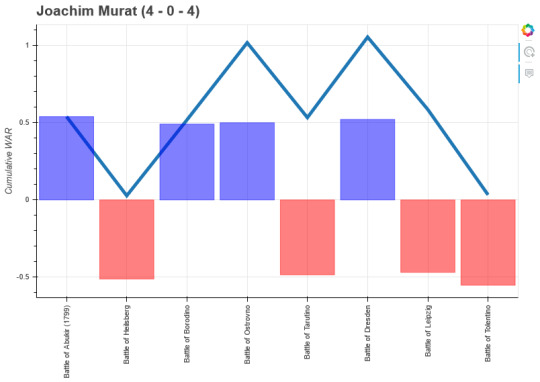
(Link)
Lol Tolentino, I do like how Murat Peaked there a little bit
But we're forgetting a certain redhead, aren't we?

(Link)
Ouch. But also Waterloo not appearing there, hmmm.
Anyway let's finish off the screenshots with Napoleon's greatest strategist, Jean-de-Dieu Soult, the man that Wellington called a master of the defensive!

(Link)
honestly this is the entire reason why i wanted to write this post
in soult's defense - as a soult defender - he had a pretty shitty army full of conscripts, was isolated, was occasionally pretty bad at adapting tactically to new surprises and had to deal with the english being stubborn fuckers, but he was brilliant in setting things up strategically and forcing the english to catch up through a fighting retreat with a demoralised army, stopping them from closing in on france too
but also the way this graph bullies soult so hard makes me laugh a lot
Anyway, yeah, these graphs are definitely inaccurate and I'm also posting these to see the Napoleonic community on tumblr's reaction to them, but they are a fun way to engage with history!
Just don't take them seriously, and feel free to argue in the tags/comments/reblogs
I could theoretically use this guy's code to rerun this just for the Marshals now - I know my way around some data science code - but I do have a lot on my plate, but it would be a fun experiment!
Marshal WAR Graph Links
Note: So these are under the Wikipedia article names at the time that the web scraper was run seven years ago so some of these names turned out to be different from what they are now and I had to do a bit of digging to fix some
you can definitely tell that the information is incomplete on a lot of these, again i repeat the information was scraped off wikipedia seven years ago
Louis-Nicolas Davout
Jean Lannes
Joachim Murat
Michel Ney
André Masséna
Jean-de-Dieu Soult
Bon-Adrien Jeannot de Moncey (one battle lol)
Jean-Baptiste Jourdan
Charles-Pierre Augereau
Jean-Baptiste Bernadotte aka Charles XIV John of Sweden (Two battles and only Swedish ones I think)
Guillaume Brune
Édouard Mortier (two battles)
Jean-Baptiste Bessières (two battles)
François Christophe de Kellermann (one battle, Valmy)
François Joseph Lefebvre (two battles)
Charles-Victor Perrin (ouch)
Étienne Macdonald
Nicolas Oudinot (lol)
Auguste de Marmont (loll)
Laurent de Gouvion Saint-Cyr
Józef Poniatowski (three battles but hmm. pretty bad but feel like there's too much missing info here)
Emmanuel de Grouchy (two battles, can't make a Where's Grouchy joke)
Marshals Without Graphs
Not because they didn't command anything but I couldn't find their graphs on the website or in the code repo
Catherine-Dominique de Pérignon
Jean-Mathieu-Philibert Sérurier
Louis-Gabriel Suchet (wtf? maybe seven years ago the documentation on him was sad)
EDIT: wait i was looking at the notebook (the uh place where the code was being run, to see if i could run the code myself)
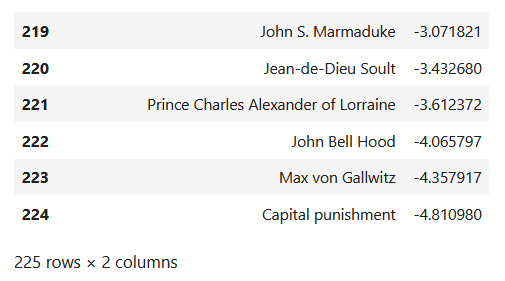
soult is one of the lowest ranked generals overall on this initial list pfftHAHAHhahahahahahahaha
#napoleon's marshals#napoleonic era#napoleonic wars#napoleonic shitpost#cadmus rambles#cad rambles about dead frenchmen on main#jean lannes#louis-nicolas davout#joachim murat#michel ney#andre massena#im not tagging all of them#jean-de-dieu soult
35 notes
·
View notes
Text
The Marshalate (Part 2)
Continuing with David G. Chandler’s writings about the marshalate, from my copy of his The Illustrated Napoleon:
But the price he demanded in return for these honors was high. The marshals were required to go on active service in command of the corps d’armee or in senior staff appointments year after year. They were not protected against shot and shell: fully half were wounded one or more times as marshals (Oudinot on no less [sic] than eight occasions), and three - Lannes, Bessieres and Poniatowski - were killed in action or died of wounds sustained in battle. High rank was not a guarantee of personal survival in the early nineteenth century, as military leadership was carried on very much from the forward edge of the battle area (Napoleon himself, of course, being twice wounded - at Toulon [1793] and Ratisbon [1809] - and narrowly avoiding death at Arcola [1796], in front of Acre [1799] and at Arcis-sur-Aube [1814], besides surviving several assassination attempts). Four more met violent deaths outside the field of battle: Murat and Ney in front of firing squads, and Brune at the hands of a royalist mob (all in 1815), while in 1835, Mortier, at the age of sixty-seven, became the victim of an “infernal machine” intended for Louis-Philippe. Berthier’s demise in 1815 remains a mystery; he may have been a fifth.
Apologies for being so detail-obsessed, but it should be “Oudinot on no fewer than eight occasions”. As in “I use less [uncountable quantity] salt in my cooking than before, so I have modified no fewer [it’s possible to count how many] than thirty of my favourite recipes.” It’s possible to count Oudinot’s injuries as a marshal, eight times, so it’s no fewer, not no less. Although some might argue with little exaggeration that Oudinot’s wounds were without number.
There. I got that off my chest, this grammatical mistake that rattles my teeth every time. Now onto something else that bothers me in this paragraph: Chandler alludes to the possibility that Berthier was murdered. While Berthier’s death was certainly violent, I think the likelihood that a team of assassins was sent to throw him from a high window is vanishingly small. I wrote about this at some length in a September 2021 post entitled How Berthier died: An opinion piece.
Back to Chandler:
Even when not on campaign, Napoleon kept his marshals busy with diplomatic, administrative and court duties, which left them little time to enjoy their privileges. He also fanned their rivalries and dislikes - even hatreds - believing in the benefits of “divide and rule”. He intended them to be instruments of his imperial will both on campaign and in battle, and did little to encourage the development of individual talents or independent command skills by way of formal training. Three - Massena, Davout and Suchet - were truly notable commanders in their own right, and would have made names for themselves regardless of any connection with Napoleon; but many of the remainder were far from outstanding commanders at the strategic or operational level, though all were good tacticians and brave individuals able to inspire their troops.
All was well, therefore, while they remained beneath their master’s eye. But when the exigencies of service separated them from the emperor (as in 1812, when Napoleon was fighting in Russia and other French troops were fighting in Spain), problems would often arise. Untrained in independent campaigning, incapable of fighting in a properly integrated command team (as no marshal would acknowledge any other as his superior), the marshals in Spain and elsewhere often allowed their personal feuds to overcome their sense of duty when Napoleon was not present to keep them in line and up to the mark; the results were defeats, disappointments and failures. War-weariness became increasingly noticeable after the disasters of 1812 and had not been unknown among the marshals in earlier years. Only those who were incapacitatingly wounded or had the fortune to incur Napoleon’s wrath and were in consequence left unemployed were able to secure any real rest or time to live with their families and enjoy their privileges. In the end, the system let the emperor down badly. At Fontainebleau in April 1814, a group of marshals, led by Ney, mutinied and enforced Napoleon’s first abdication. During the Bourbon restoration, most of the marshals made their peace with the new regime and several served Louis XVIII in high positions. In 1815, when Napoleon returned from exile on Elba for the “Hundred Days”, only a handful of his former marshals rallied to the tricolor; others continued to be loyal to the Bourbons or made themselves conspicuous by their absence from Paris, ignoring summonses from Davout (Napoleon’s minister of war) or finding excuses for not complying with his orders on behalf of the emperor.
David G. Chandler, The Illustrated Napoleon. New York: Henry Holt and Company, 1973, 1990. pp. 90-92.
Of the marshals who were incapacitatingly wounded, I know for a certainty about Augereau, wounded at Eylau, and Marmont who almost lost an arm in Spain. Soult was severely wounded early in his career, though I don’t remember, assuming I ever knew, how long he was allowed for his recovery ( @josefavomjaaga ?)
When Chandler refers to war-weariness even before 1812, I believe he has Lannes in mind (confirmation from @maggiec70 about this?). I don’t know enough about this to figure out if Chandler also was thinking of other marshals, though I would not be surprised if Augereau had had his fill also well before 1812. As to war-weariness after 1812, nothing would be less surprising; I can’t even start to imagine the effect of the calamitous Russian campaign on the minds of the marshals, and indeed of every member of the military who had the misfortune to witness it.
About the handful of marshals who rallied to Napoleon in 1815, here is what I know: as Chandler wrote, Lannes, Bessieres and Poniatowski were dead; Bernadotte was in Sweden and part of the coalition against Napoleon; Berthier was a virtual prisoner in Bavaria, and would soon be dead; Serurier, Perignon and Kellermann had been out of active service for a dozen years at least, and my guess is that Napoleon would not have given them active commands anyway; Gouvion Saint-Cyr, I believe, and certainly Oudinot, chose to remain neutral; Macdonald, Marmont, and Victor remained at the service of Louis XVIII; Murat was otherwise occupied, though I don’t know precisely the chronology of his activities in 1815 ( @joachimnapoleon : help? pretty please?).
Of those who did join Napoleon in his final adventure, but not necessarily from its very start, there were: Brune, whose decision cost him his life at the hands of a mob; Davout, disastrously left in Paris; Grouchy; Mortier, incapacitated at the time of Waterloo; Massena, with the utmost reluctance; Ney, whose decision also cost him his life; Soult; and Suchet.
I am unsure about the stance taken by Jourdan, Lefebvre and Moncey at the time.
Coming soon, the final part of this topic.
40 notes
·
View notes
Text
At the storming of Ratisbon, Lannes won great notoriety for his actions. The Austrians’ fire was devastating as they struck down one French column after another. Resolute, Lannes ordered a third assault, which the soldiers obeyed reluctantly. Instantly, Lannes exclaimed, “Well, I will let you see that I was a genadier before I was a Marshal, and still am one.” Seizing a ladder, he carried it toward the breach. His aides tried to stop him, but he was defiant. At last, Lannes’s aide-de-camp, Marbot, cried, “Monsieur le Maréchal, you would not wish us to be disgraced, and that we should be if you were to receive the slightest wound in carrying that ladder to the ramparts as long as one of your aides-de-camp was left alive.”
Marbot and another officer dragged the ladder away from their protesting leader. The sight of a marshal arguing with his aides over leading the assault had achieved the desired effect; the whole division was roused to action. Armed with ladders, they charged the ramparts, with Marbot the first one over the wall. Lannes soon rushed the gate with infantry, storming through the Austrian defenders.
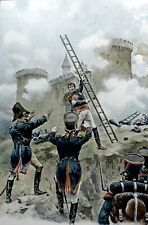
From:
https://warfarehistorynetwork.com/2015/11/05/napoleon-bonapartes-roland-marshal-jean-lannes/
#napoleonic#battle of ratisbon#jean lannes#yes the ladder story again#in this house we always reblog the ladder story#the fiery one#ladder lord
32 notes
·
View notes
Text
(Some) Greek Gods as Historical Figures
So some days ago I secretly logged back into Mythology and Cultures amino and I stumbled across post of casting historical figures as the gods from Greek mythology. Of course, I hated it, so I made my version of this.
Note: Of course, this is going to have quite a lot of Napoleonic figures, since I am more familiar of this period, but please do reblog this post (or tag me on another post) with the hashtag “#mythical figures as historical people” and add some more of your historical figure Greek God fancasts!
Note 2: this post is for entertaining purpose, and just me introducing some guys to y’all and I am not a historian myself and hopefully you all would still like my takes😅
1. Zeus - Louis XIV of France
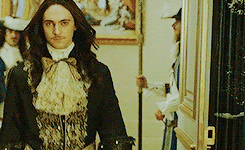
First and foremost, I shall introduce the king of gods featured in Greco-Roman myths. You may ask, why don’t I cast Henry VIII of England? Well, my reason is very simple: Henry is far from accurate to Zeus in actual myths.
To be honest, Zeus has a more “absolute power” energy in it, and Louis XIV totally has rocked it (like that iconic line “l’état, c’est moi (I am the state)”). Well, Henry also has that kind of energy but everyone only remembers his six wives and the uncountable number of bloodshed (not to mention Catherine of Aragon is a much better fighter than him—got this from Horrible Histories OwO)... Anyways, Louis XVI is basically a Zeus.
2. Hera - Catherine of Aragon

This brings to Catherine of Aragon herself. She’s a total Q U E E N and if you have watched “Six” the musical you already got what I mean (like, being the wife who married to Henry the longest). There’s also the early warlike aspect in Hera (featured in Homer’s works) that Catherine has it as well (at least you know that she’s getting more victories than Henry if you have watched Horrible Histories season 6, in the episode with Rowan Atkinson playing Henry VIII (which is sad because I want Ben Willbond to play him—he iconic to the HH fandom)), making her a great casting of Hera.
Hera, in my opinion, is a very strong woman who has to take Zeus’s shit and I could totally understand why she took revenge on the girls that Zeus has slept with—but anyways, hopefully you guys would like it :3
3. Aphrodite - Pauline Bonaparte
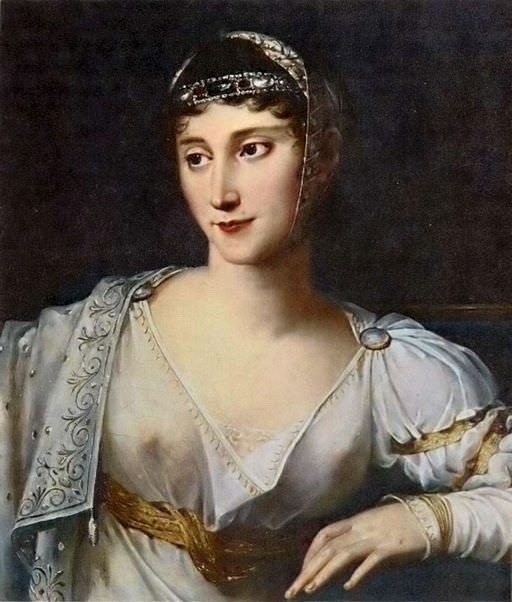
This is half-self-explanatory, really—just look at that statue she posed as Venus, the Roman equivalent of Aphrodite.
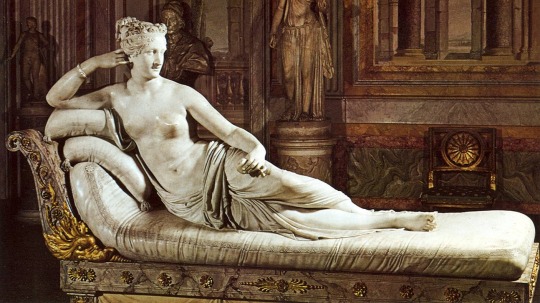
Pauline was famed for her beauty in her time, also a big chunk of scandals from her affairs (which bugs her big brother Napoleon, a lot). Nevertheless, despite her big spending habits and a great sexual appetite, she always helped Napoleon in some surprising ways (like she sold her house in Paris to the Duke of Wellington to get the funds for Napoleon).
Just like Aphrodite herself, Pauline harnessed her beauty very well. Thus, I rest my case.
4. Apollo - Joachim Murat or Emperor Franz Joseph I of Austria
(Warning: long content ahead)
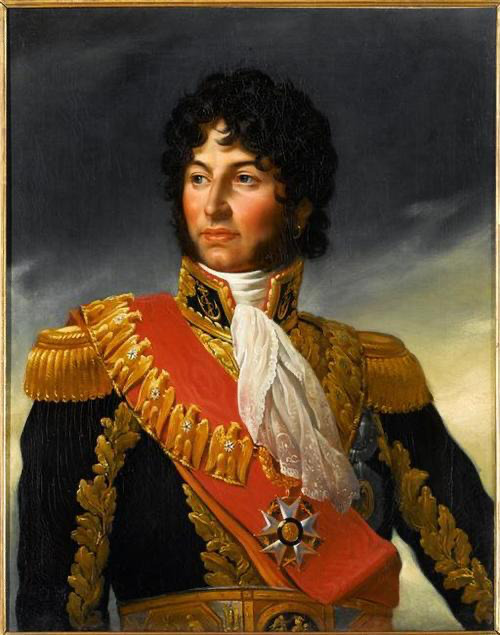
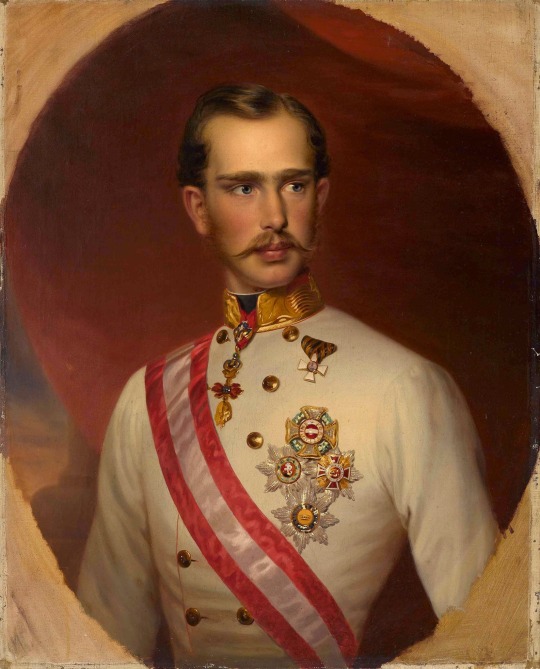
Firstly, let me briefly introduce them because you guys might not know them much.
Joachim Murat was a marshal of France, also one of Napoleon’s brother-in-law, grand duke of Berg and Cleves from 1806 to 1808 and the King of Naples from 1808 to 1815. After the wars, he attempted to escape yet was caught and executed in 1815 in Pizzo, Italy (if you have read of Alexandre Dumas’s “Famous Crimes” you might know him—by the way no one has cut his head off and sent it to that big nose King Ferdinand).
For those who have watched “Elisabeth” or the “Sissi” movies, you might know Franz Joseph I of Austria already but you might not know much about himself besides being the husband of the (in)famous Empress Sisi (ie. Empress Elisabeth of Austria). He was the Emperor of the Austria from 1848 to his death in 1916—one of the longest reigning European monarchs in history. During his reign, the empire had been through a lot of change, most notably, the creation of Austria-Hungary. Nevertheless, he was also the Emperor who started World War I and he died of old age in the midst of the Great War.
For Apollo, I’m not casting musicians because this is quite overdone. I rather want to shed a light to the other arts that he represented in Greco-Roman mythology. This makes me want to draw a parallel to Joachim Murat as he was also a great sucker of classical literature. Plus, he also was known to be a flamboyant dresser (his nickname was “the Dandy King” by the way), also the designer of the uniforms of the Neapolitan army (with an excessive amount of amaranth, perhaps his favourite colour). Really, everyone just sees him as a great flamboyant himbo but in reality, he’s iconically badass in the battlefield as the First Horseman of Europe. Well, also he’s known for being extremely good with women even though his wife Caroline was fierce as hell. So, in my opinion, he fits the image of Apollo that we know.
However, you guys might feel surprised why I picked Franz Joseph for Apollo. Well, he really... was a rather mediocre ruler in my opinion, and perhaps our most memorable image of him was the senile emperor who signed the declaration of war to Serbia. Nevertheless, he was a well-liked man among his subjects, at least to some old citizens of Austria-Hungary telling future generations. Besides, culture flourished in Vienna under his reign—with notable figures like Sigmund Freud, Ludwig Wittgenstein and Erwin Schrödinger. Despite the series of unfortunate events which made the empire started to crumble, Austria-Hungary arguably has its cultural importance in Europe. Sounds like what Apollo would do if he’s a ruler, somehow.
Well, enough of his political achievements, let’s talk about his private life... which was probably the actual reason why I picked him.
Enter Duchess Elisabeth in Bavaria, the Empress of Austria and Queen of Hungary, also known as Sisi.
On a side note, Marshal Louis-Alexandre Berthier of France, Prince of Neufchâtel and of Wargram, was Empress Sisi’s grand-uncle in-law via his marriage to Duchess Maria Elisabeth in Bavaria

Absolutely love Pia as Elisabeth in the musical so please don’t mind me using a gif from this :3 ((also, “Elisabeth” spoiler alert
Franz originally was to marry her sister Helene (nicknamed Néné), nevertheless, on the first meeting in Bad Ishl, he has fallen for the young Elisabeth, head over heels—making him defying his domineering mother, Archduchess Sophie, for the very first time. Elisabeth also liked him and did not expressed her refusal either, so they got married in St. Augustine’s Church in 29th April, 1854.
However, the marriage was not well. Sisi was not accustomed to the strict Austrian court especially Archduchess Sophie (also she was not really a fan of intimacy). Poor Franz was rather helpless in situations between his mother and his wife, and eventually, Sisi chose her freedom over her duty as Empress, traveling around the world. They two briefly went back together during the Austro-Hungarian compromise, yet she was constantly not there. Eventually, Sisi was assassinated by an anarchist named Luigi Lucheni during her stay in Geneva, Switzerland, and Franz was devastated over her death (“she will never know how much I love her”).
To Franz, he loved her so, but he really didn’t understand her needs. Even though he had countless mistresses and female companions in Vienna, he still missed his wife. I say, he was really unlucky when it comes to love. Like Apollo himself, he dated countless nymphs and humans, but a lot of his notable relationships did not have a good end. (Probably Cyrene was the most lucky one, yet she also has chosen to be left alone after mothering several children with Apollo.) For this, I picked Franz Joseph as Apollo.
5. Ares - Jean Lannes or Michel Ney
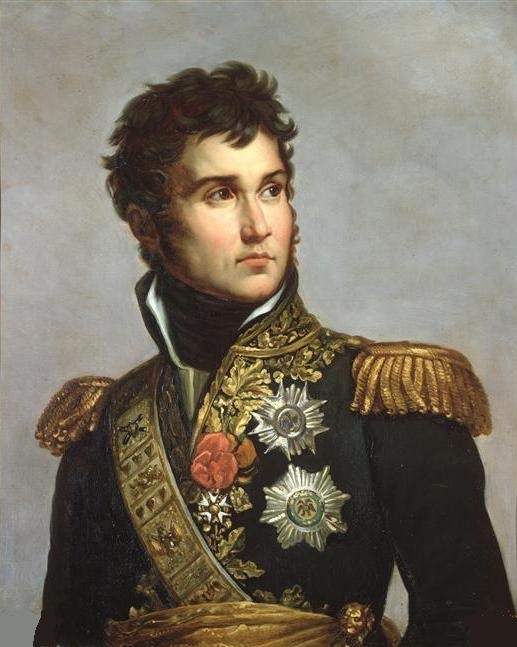
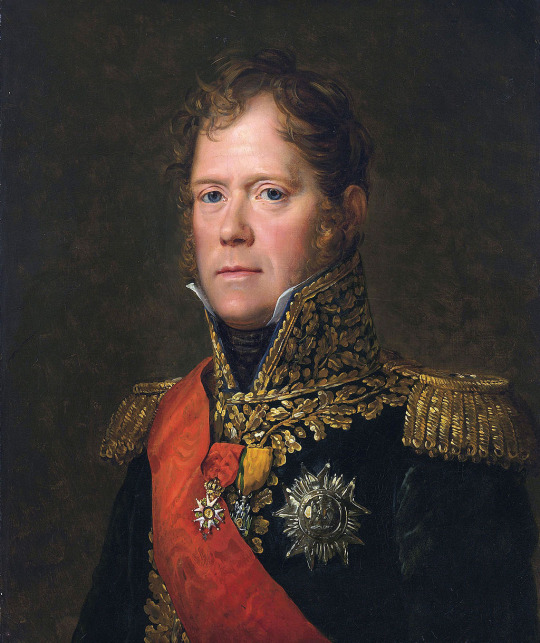
As usual, for those who don’t know much history, I shall briefly introduce my babeys these two great soldiers.
Jean Lannes was one of the marshals of Napoleon, known for being one of Napoleon’s closest friends and his fiery personality, and is considered one of the best marshals of the 1st French Empire. His finest moments including the Battle of Ratisbon in which he led his men to storm the well-guarded city with ladders (hence his nickname “ladder lord” in our very humble Napoleonic marshalate fandom :3). Sadly, he died of the wound he received in the battle of Aspern-Essling in 1809.
Michel Ney was also one of the marshals of Napoleon, known for his extreme valour (yep, he is known as the “Bravest of the Brave”). As you might know, he was one of the marshals who was in Waterloo, yet, his finest hour was during the retreat from Russia in the disasterous 1812. Sadly, he was arguably the most prominent victim of the White Terror under the second Bourbon restoration, executed in 1815 (**I am not accepting any kind of conspiracy theories of my babey survived and died in America😤).
Speaking of Ares, I have a lot of things to say (that’s my dad ;-; no jkjk). He is really not that bloodthirsty idiot who casually hates humans. Well, he’s more like a fiery dork and a man who was very faithful to his lovers, and fights very well (by the way also one of the best dads). So, the bois that come into my mind are automatically two of the most courageous marshals of France.
Lannes, if I have to get him a godly parent, it would definitely Ares. He resembled the god a lot (also I sometimes imagined Ares as a smol bean with dark hair), probably looks the most like Ares himself. He got that fiery temper, that faithfulness to his wife Louise, also being a very courageous fighter in the field—well he literally was like, “NO LEMME STORM DAT CITY *grabs ladder*”.

There you have it, my big bro our ladder lord Jean Lannes who can pull off a perfect Ares.
Ney is like a slightly introverted (and mature) version of an Ares person. You can guess his temper already through his famed auburn hair, and indeed despite his shy exterior his temper sometimes was a bit explosive, and a bit impatient (which was somehow one of his fatal flaws). He was a great fighter, known as a skilled swordsman in his youth. And you all know how brave he is in his famed epithet. Michel Ney is purely badass (and C U T E) you know (and he needs a lot of hugs because he has really been though a lot in the wars, and was a possible case of PTSD which was shown in his arguably suicidal behaviour during the battle of Waterloo). That’s why I casted him as the Greek god Ares OwO
//
And there you have it, my interpretations on the Greek gods via people in history. I originally would like to include more but somehow I realised that I have written too much about my picks. So, if you want to add more, reblog this post or tag me on the post you made on this topic (and please use the hashtag “mythical figures as historical people” so that I could look into your choices via the search bubble on this app🥺).
Last but not the least, I hope you all lovelies like this, also have learnt something new via my brief introductions on some historical people. Have a great day!
#greek mythology#finally some Greek mythology content#i hope you all don’t mind me overselling my bois#no shipping intended on the castings#this is from an ex-Hellenic devotee who had been in Classics class#Zeus#Hera#Aphrodite#Apollo#Ares#methods of procrastinating from university tasks and responsibilities#why am I still up in 2am I said I would get a proper sleep tonight for excessive headbanging to David Bowie for his birthday🌚#the relationship between Franz and Sisi got me sobbing all the time#Louis XIV#Catherine of Aragon#pauline bonaparte#joachim murat#franz joseph i#elisabeth of austria#elisabeth of bavaria#empress sisi#jean lannes#michel ney#mythical figures as historical people
92 notes
·
View notes
Note
Was Napoleon ever injured in battle?
Yes. He told O’Meara about it on Saint Helena.
“Napoleon showed me the marks of two wounds; one a very deep cicatrice above the left knee, which he said he had received in his first campaign of Italy, and was of so serious a nature that the surgeons were in doubt whether it might not be ultimately necessary to amputate. He observed that when he was wounded it was always kept a secret, in order not to discourage the soldiers. The other [wound] was on the toe, and had been received at Eckmuhl.
"While he was dressing he put his hand on his left thigh, where there was a deep scar....he told me it was the mark of a bayonet wound by which he had nearly lost his limb at the siege of Toulon.
"He added that he had been wounded several times; that at the battle of Ratisbon a ball had struck his heel; and at the battle of Essling or Wagram another had torn his boot and stocking and grazed the skin of his left leg.
"I asked if he had not been frequently slightly wounded. He replied, 'Several times, but scarcely more than once had I occasion for surgical assistance, or any fever in consequence of a wound. At Marengo a cannon-shot took away a piece of the boot of my left leg, and a little of the skin,' said he, showing the mark to me, 'but I used no other application to it than a piece of linen dipped in salt and water.' I asked about a wound of which there was a deep mark on the inside of the left thigh, a little above the knee. He said that it was from a bayonet.”
20 notes
·
View notes
Text
"At the battle of Ratisbon one of my comrades was horribly wounded by a cannonball which struck him exactly on that fleshy part on which one is accustomed to sit" is such a stupid long way to say someone got shot in the butt
3 notes
·
View notes
Note
Do you happen to know anything about Napoléon's bullet wound in the leg? Not his wounds from Toulon or Ratisbon. Supposedly it happened at Aspern-Essling or Wagram, but in order not to alarm his men Napoléon didn't make it known. But he may have hid it so well apparently modern historians still aren't sure. I remember his autopsy showed a bullet indentation in the thigh. Do you have any information?
I think you have about it all down. Supposedly he was wounded in the ankle but it was just a graze by a bullet, he had it dressed and returned to battle. I am sure he did hide it, or down-play it due to his men.
6 notes
·
View notes
Text
21 March 1918 diary of Dr J S Muir of Selkirk, part 2
The Soldier’s Dream by Thomas Campbell (1777-1844)
Our bugles sang truce, for the night-cloud had lower'd,
And the sentinel stars set their watch in the sky;
And thousands had sunk to the ground overpower'd,
The weary to sleep and the wounded to die.
When reposing that night on my pallet of straw
By the wolf-scaring faggot that guarded the slain,
At the dead of the night a sweet Vision I saw,
And thrice ere the morning I dreamt it again.
Methought from the battlefield's deadly array
Far, far I had roam'd on a desolate track:
T'was Autumn,—and sunshine arose on the way
To the home of my fathers, that welcomed me back.
I flew to the pleasant fields traversed so oft
In life's morning march, when my bosom was young;
I heard my own mountain-goats bleating aloft,
And knew the sweet strain that the corn-reapers sung.
Then pledged we the wine-cup, and fondly I swore
From my home and my weeping friends never to part;
My little ones kiss'd me a thousand times o'er,
And my wife sobb'd aloud in her fullness of heart.
"Stay—stay with us!—rest!—thou art weary and worn!"—
And fain was their war-broken soldier to stay;—
But sorrow return'd with the dawning of morn,
And the voice in my dreaming ear melted away.
From ‘English Poetry II: From Collins to Fitzgerald’, The Harvard Classics, 1909–14.
This verse is by Glasgow poet Thomas Campbell, who articulated the pity of war through what T-C Ho calls a “dream-vision framework” in what has been described as a modern style. In the poem Campbell, in response to the battles of Ratisbon and Ingoldstadt, writes of a “war-broken soldier”. He influenced later war writing, in particular that of the Crimea, and this poem was also put to music on several occasions. It was anthologised in Palgrave's ‘Golden Treasury’, London, 1906 a copy of which, by coincidence, was part of the library of Wilfred Owen who wrote explicitly of “the pity of war” and produced a quirky, rather unsatisfactory poem, also called ‘Soldier’s Dream’ while at Craiglockhart in 1918.
See also:
Ho, T.-C., (2015). The Afterlife of Thomas Campbell and ‘The Soldier’s Dream’ in the Crimean War. 19: Interdisciplinary Studies in the Long Nineteenth Century. 2015(20), p.None. DOI: http://doi.org/10.16995/ntn.714
“The soldier's dream, together with The cabinet of wonders”, Isaiah Thomas Broadside Ballads Project, accessed January 28, 2018, http://www.americanantiquarian.org/thomasballads/items/show/57
Simcox, Kenneth, “Soldier’s Dream”, The Wilfred Owen Association, accessed January 28, 2018, http://www.wilfredowen.org.uk/poetry/soldier-s-dream
O'Keeffe, Timothy, "Ironic Allusion in the Poetry of Wilfred Owen," Ariel: A Review of International English Literature 3(4): pp.72-81, October 1972
Hibberd, Dominic, Ed., ‘Wilfred Owen, War Poems and Others’, London, 1975, p.80
Stallworthy, Jon, ‘Wilfred Owen, A Biography’, Oxford, 1977, p.316
0 notes
Text
Austria attacks, but dithers.
Napoleon had received reports of increased belligerency in Austria while campaigning in Spain, and spent several months rebuilding his forces in Germany. In January 1809 he had instructed the Confederation states to mobilize their contingents, and he combined these witht he remaining French forces east of the Rhine as the Army of Germany to deter Austria. Eugène de Beauharnais and Prince Jozef Poniatowski both received detailed instructions on preparing defenses of Italy and the Grand Duchy of Warsaw. Napoleon then recalled his stalwart commanders- Lannes, Lefebvre, and Bessières- from Spain, but, not willing to provoke Vienna, he remained in Paris, appointing Marshal Alexandre Berthier, his redoubtable chief of staff, as acting commander of the French forces in Germany. Napoleon thus expected war but did not think the Austrians would start it before May. Charles's attack therefore caught the French army unprepared. Berthier, as masterly as he was under Napoleon's supervision, struggled in the absence of the emperor. His aide was distressed to see this man, "so calm in the midst of fire, whom no danger could intimidate, trembling and bending under the weight of his [new] responsibility." Berthier's confuse directives, compounded by bad weather and subsequent interruption in optical telegraph transmissions from Napoleon, failed to concentrate the French army, which, on the eve of the war, was split in two groups, with some corps still proceeding to their designated locations. Three French corps were scattered in the region between Munich, Augsburg, and Ratisbon (Regensburg), while Marshal Masséna with IV Corps was still on the march from Frankfurt to Bavaria. More significant, Marshal Davout's III Corps at Ratisbon was far ahead of the remaining French forces and vulnerable to Austrian encirclement.
Had the Austrians struck in March or carried out their April offensive with greater vigor, they perhaps could have gained victories that might have induced Prussia to act. Instead, they dithered. And once the offensive began, the Austrian army, even after four years of reforms, performed lethargically and failed to exploit its advantages. As his opponent wasted precious time, Napoleon swiftly reacted to the new threat. Leaving Paris on April 13, he reached the front and took personal command of the army on the seventeenth. His presence and leadership roused the army and filled his subordinates with a sense of duty and urgency. Napoleon responded to the Austrian offensive by launching a counterstrike that used the corps of Davout and Lefebvre as a holding force upon which the rest of the French army pivoted to engage the enemy. On April 21, in a series of encounters that collectively became known as the Battle of Abensberg, Napoleon engaged what he believed to be the larger portion of the now divided Austrian army and directed morst of his troops against just 36,000 men of Feldmarschalleutnant Johann Hiller, which formed the left flank of the Austrian army. The French overwhelmed Hiller, driving his men across the Isar River at Landshut and seizing a quarter of his men and most of his artillery and transport. It was then that Napoleon learned that the bulk of Archduke Charles's army was, in fact, in the north, attacking Lefebvre and Davout at Eggmühl. The Austrians might have scored a victory here had it not been for Davout, the "Iron Marshal", who doggedly defended the town. On April 22, with Davout's men having almost exhausted their ammunition and dropping from fatigue, the reinforcements that Napoleon had dispatched came rushing in, forcing Charles's army to retreat toward Bohemia in some confusion. With the road to Vienna open, the French entered the Austrian capital on May 13.
Alexander Mikaberidze- The Napoleonic Wars, A Global History.
#napoleonic#alexander mikaberidze#the napoleonic wars: a global history#napoléon bonaparte#louis alexandre berthier#louis nicolas davout#eugène de beauharnais#jozef poniatowski#jean lannes#françois joseph lefebvre#jean baptiste bessières#andré masséna#archduke charles#battle of abensberg#battle of eckmühl#i would struggle too in berthier's place
8 notes
·
View notes
Text
“The great and lasting glory of Napoleon’s marshals“
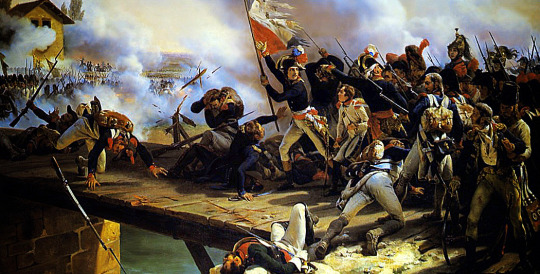
At all times, our soldiers have needed leaders who show themselves and set an example. The white plume of Henri IV, the staff of the Prince de Condé, the Arcole flag, this is what ignites the men from between the Rhine and the Ocean, so quick to enthusiasm, so inclined, too,to believe themselves abandoned by their leaders. All in all, the great and lasting glory of Napoleon's marshals will be that they were the first to risk their lives and spill their blood, whenever it was necessary to lead the hesitant mass of soldiers on the road to victory and death. At Eylau, Augereau, crippled with rheumatism, shivering with fever, got himself tied to his horse and ran to put himself at the head of his army corps. In Ratisbon, Lannes, feeling the wave of assault weaken, exclaims: "I am going to show you that before I was a marshal, I was a grenadier, and that I still am one!" And grabbing a ladder, he runs into the breach, in full dress. His aides-de-camp stop him, tear off the ladder, fly to the walls and clear the way for the army.
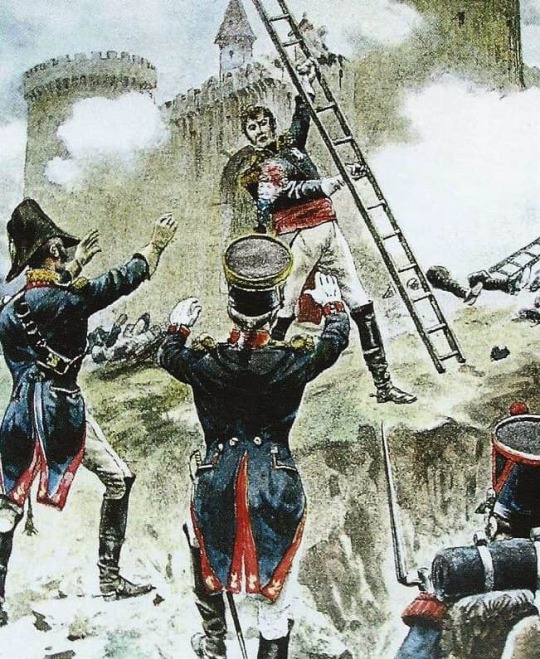
[..]
Thus was it with Lefebvre who "constantly found himself in the vanguard during the war of liberty", with Mortier who according to the count de Ségur "was always ready to the sound of the cannon and who never made anyone wait for him on a battlefield. "
Thus Murat, who "exposes himself more than a soldier"; speaks amid bullets [..]
At the Battle of Moskowa, Ney, who was to bear that name, displayed no less personal value than his royal colleague. He was seen dismounting and charging, sword in hand, at the head of the battalions. Throughout the campaign he set an example; and, if he succeeded in saving the remains of his army corps during the retreat, it was by making himself an infantryman and a tirailleur.
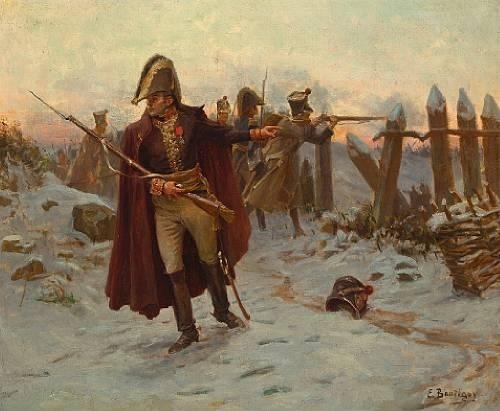
[..]
It is with this vision of desperate heroism that we want to close this review of the little facts that made the Emperor's companions so popular. A leader's place, no doubt, is at his command post, but the best should not be afraid, at critical times, to abandon the heights where their merit has placed them to get their hands dirty and revive, by their presence, failing energies. From Masséna lending his shoulder to carry a cannon, in his first Italian campaign, to Moncey defending, sword up, the barrier of Clichy, examples of the intimate union of the chiefs and their troops are not lacking. It is to the army that the marshals are themselves most, that they least think of disguising their nature. This is also where they are the most sympathetic. [..]
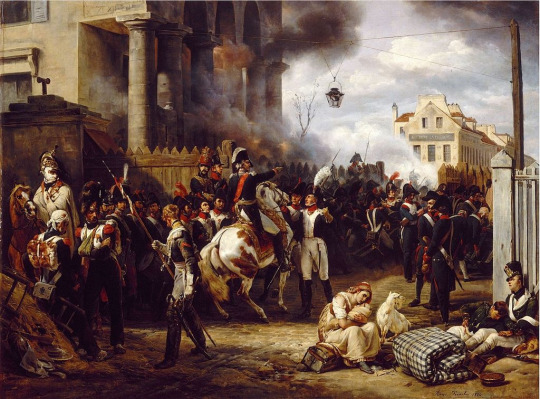
As soldiers, they're head and shoulders above their time.
Louis Chardigny - Les Maréchaux de Napoléon
#napoleonic#louis chardigny#les maréchaux de napoléon#the marshals in the army#pierre augereau#françois joseph lefebvre#édouard adolphe casimir joseph mortier#joachim murat#michel ney#jean lannes#andré masséna#bon adrien jeannot de moncey#isn't this why we always reblog the ladder story and russia!ney#these are some of my favorite anecdotes#also the white panache thing yes and murat understood it very well#respect for the enthusiastic young soldiers and the old leaders still fighting in the middle of their men#even sick as a dog#the superior moments#the best part of the marshals :)
56 notes
·
View notes